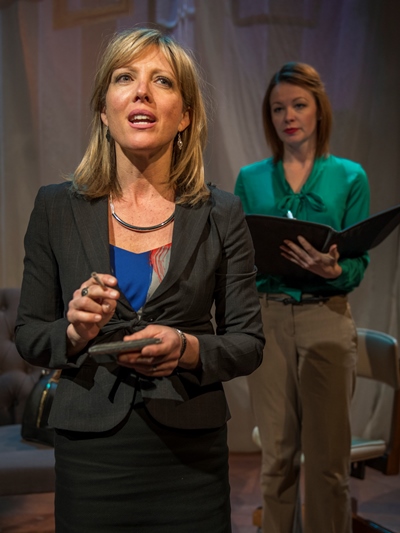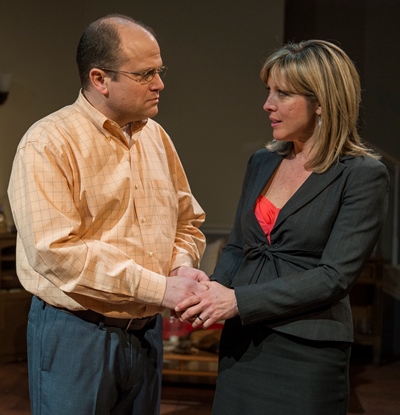‘The Other Place’ at Profiles: Brilliance provides no defense when dementia lays its dark siege
 Review: “The Other Place” by Sharr White, at Profiles Theatre through April 5. ★★★★★
Review: “The Other Place” by Sharr White, at Profiles Theatre through April 5. ★★★★★
By Lawrence B. Johnson
Julianna knows that her husband, a doctor, is cheating on her. He sometimes slips and refers to a fellow physician – who has been consulting with Julianna about her episodes of disorientation, forgetfulness and anger – not as Dr. Teller, but as Cindy. That should tell you something. It’s plain enough to the betrayed wife, and she’s outraged.
The mental decline and crash of this fiftyish woman, a biophysicist, is the substance of Sharr White’s play “The Other Place.” But it is not the sum. To grasp its astounding totality, betake yourself to the precisely etched, wrenching, scary production at Profiles Theatre. Here is one of the most rewarding, and most surprising, nights I’ve spent in a Chicago theater in recent seasons.
 Surprising even though I knew “The Other Place” from its New York run a couple of years ago. Profiles’ staging, directed with a sure hand by Joe Jahraus, capitalizes on an intimate space and two stellar performances – by Lia D. Mortensen as Julianna and Steve Silver as her husband Ian – to throw light into the fractured recesses of a woman’s mind and onto the courage of a grieving man who is in their marriage for the long, hard haul.
Surprising even though I knew “The Other Place” from its New York run a couple of years ago. Profiles’ staging, directed with a sure hand by Joe Jahraus, capitalizes on an intimate space and two stellar performances – by Lia D. Mortensen as Julianna and Steve Silver as her husband Ian – to throw light into the fractured recesses of a woman’s mind and onto the courage of a grieving man who is in their marriage for the long, hard haul.
We get to know Julianna and Ian, and begin tentatively to grasp their crisis, through intertwined narrative threads: As she pitches a gathering of neurologists for a new medication her company has engineered, Julianna also meets with her suspected rival, Dr. Cindy Teller (Nina O’Keefe), and wrangles with her husband, an oncologist who also has been evaluating her case. Julianna is convinced she has brain cancer. Which brings us to a paradox: the bad news that she does not have cancer. It is something else.
 Mortensen is galvanic as the brilliant scientist whose rational moorings grow ever less secure. This Julianna is an imposing woman, savvy and exceptional; but she’s also reeling within and steadily disconnecting from the real world. Even as Julianna fumes at her husband over imagined infidelities, she pleads with him to acknowledge her need to reconnect with their estranged married daughter Laurel – whom she hasn’t seen in years but who lately has been in touch by phone. Laurel calls all the time, she says. Actually, she insists.
Mortensen is galvanic as the brilliant scientist whose rational moorings grow ever less secure. This Julianna is an imposing woman, savvy and exceptional; but she’s also reeling within and steadily disconnecting from the real world. Even as Julianna fumes at her husband over imagined infidelities, she pleads with him to acknowledge her need to reconnect with their estranged married daughter Laurel – whom she hasn’t seen in years but who lately has been in touch by phone. Laurel calls all the time, she says. Actually, she insists.
Then there’s the whole touchy issue of the other place, the getaway cottage Julianna and Ian bought years ago. They haven’t been back in such a long while. For good reason, we discover, when we all go there together. Keenan Minogue’s clever set design instantly converts Julianna’s pressing, claustrophobic present to a pivotal scene of the couple’s past.
Something terrible happened at the other place, something so appalling that Julianna doesn’t talk about it or even think about. But that awful time is never far from Ian’s thoughts, though he no longer sees it as the fundamental cause of Julianna’s present effect. The signs were there even before that, and he’d missed them.
 Silver’s compassionate but emotionally exhausted Ian is the resonating chamber in which Mortensen’s chilling performance achieves its full magnitude. They are an incredible twosome. As she rails and accuses, he strives mightily to calm her, keep her centered, help her. Still, when she confronts him in the most hateful, vulgar terms, he reacts as anyone might, anger answering anger. Those are amazing scenes, quite unnerving in Profiles’ close-up arena.
Silver’s compassionate but emotionally exhausted Ian is the resonating chamber in which Mortensen’s chilling performance achieves its full magnitude. They are an incredible twosome. As she rails and accuses, he strives mightily to calm her, keep her centered, help her. Still, when she confronts him in the most hateful, vulgar terms, he reacts as anyone might, anger answering anger. Those are amazing scenes, quite unnerving in Profiles’ close-up arena.
In the end, at a place where we might least expect it, the broken woman and the loving man face each other on ground that, if only for that moment, has stopped shifting. It’s not an especially hopeful patch, but at least it’s solid reality. And it’s the most devastating moment of all.
That potency springs from a prismatic collection of light: from the playwright and director as well as the two actors, but also and not least from the intercession of a new character — a young woman with her own ordinary issues but who nonetheless pauses, in the splendid portrayal by Autumn Teague, to embrace a stranger desperate for the milk of human kindness. It brings an epiphany that is wholly credible; more than that, even in the face of a dark certainty, it is exhilarating.
Related Links:
- Performance location, dates and times: Details at TheatreinChicago.com
- Preview of Profiles Theatre’s complete 2014-15 season: Read it at ChicagoOntheAisle.com
Tags: Autumn Teague, Joe Jahraus, Lia E. Mortensen, Profiles Theatre, Sharr White, Steve Silver, The Other Place











